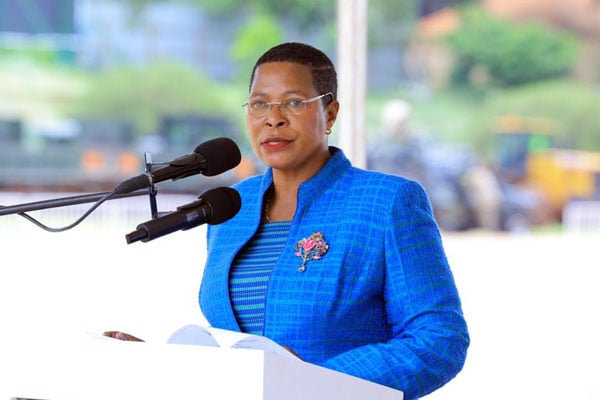Prime
Government to recruit 2,000 teachers

Some of the science teachers in Arua City hold placards during their sit-down strike over salary increment this year. PHOTO | FELIX WAROM OKELLO
What you need to know:
- The Education and Sports ministry has, however, added that not all successful applicants will be hired during the January/February 2023 window.
Thousands of unemployed secondary school teachers will start the New Year on a good note after the Education and Sports ministry revealed openings that will be filled effective January 2023.
“We are looking at about 2,000 teachers being recruited to fill seed schools, the 600 forgeries we ejected, those who have retired, and the Local Governments that received wage for hire,” the ministry’s spokesperson, Dr Dennis Mugimba, said in a statement yesterday.
He added that candidates that successfully went through the interview process in July and received notification letters will be deployed.
The Education and Sports ministry has, however, added that not all successful job applicants will be hired during the January/February 2023 window.
ALSO READ: Govt to recruit 13,000 teachers
Dr Mugimba said the aforesaid applicants would be the first to be considered when more opportunities open up.
The current batch of opportunities opened up after 400 secondary school teachers retired this year. A cleanup of the public secondary schools payroll also removed 600 teachers with forged documents after Ms Janet Museveni, the Education minister, who doubles as First Lady, commissioned the verification exercise under the auspices of the Education Service Commission.
Dr Asuman Lukwago, the commission’s secretary, warned those applying for teaching jobs to refrain from using underhand methods to get on the payroll.
Mr Filbert Baguma, the General Secretary of the Uganda National Teachers’ Union (Unatu), welcomed the impending recruitment. He, however, suggested that the deployment be done judiciously to plug all gaps across the country.
“If deployment is not sufficient to cover the entire country, then there will be no effective teaching and learning,” he reasoned, adding, “[The deployment] should be balanced enough to cover the capacity of each school.”
The Education sub-sector has been dogged with a chronically persistent problem where the teacher-learner ratio is counterproductive.
Mr Baguma advises that the Education and Sports ministry to inform the new recruits early enough such that they can adequately prepare for the new tasks as well as adapt to the new working environment.
Forgeries
Mr Baguma also suggested that the Education Service Commission always share the minutes of interviews conducted with the local governments.
He said this will serve as proof of those who qualified, and ultimately weed out the forgeries that bedevil the education sub-sector.
He also stressed the need for the ministry to improve its recruitment plan that covers the posts of deputy head teachers and head teachers.
“In the event that we don’t have the plan that promotes education officers at school level, we may have a crisis for headteachers,” he suggested, adding that some teachers were in April promoted to the level of Senior Education Officer but have never been put on the payroll.
Mr Ronald Kiberu, the commissioner-in-charge of Human Resource Management in the Ministry of Education and Sports, told Daily Monitor that currently Uganda has only 40 percent of the required secondary school teachers.
He is hopeful that consistent recruitment and appointment of teachers will bridge the existing gap.
Rationalisation
Mr Ronald Kiberu, the commissioner-in-charge of Human Resource Management in the Ministry of Education revealed that the ministry will with effect from January next year implement a rationalisation process. The process will see teachers in over-staffed schools redeployed to places grappling with staffing problems.
He said once this is effected, the percentage of secondary school teachers will increase from 40 percent to 50 percent.
Mr Kiberu said all teachers will be required to stick to the minimum teaching load under the new curriculum of 16 periods a week.
Of the 16 periods, 12 will be conducted in class and two to supervise the learners’ project work. He revealed that some teachers were teaching way below the minimum load purposely to create time to teach in private schools.
“Some could teach twice a week and go to moonlight in private schools. We now want the teachers to be available for the whole week. Our focus is going to be more on performance management for our teachers,” he said, adding that it’s not lost upon state actors that the teacher-learner ratio in Uganda is as high as 1:100. The standard ratio for both primary and secondary is one teacher to 50 learners.




